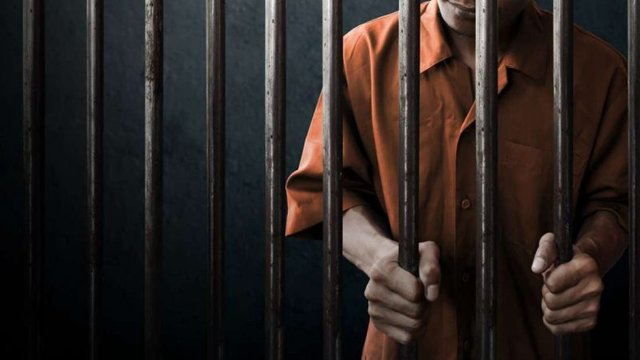For those of you that have never have experienced the criminal justice system from the inside, you should bear in mind that the opinions you have formed are all formed with only one side of the story.
You have no idea what it is to go through what the victims of 'just us' go through.
First they have foisted upon them a system of management that doesn't work for them.
For whatever reason the system has failed them.
Then the system punishes them for failing to conform.
For the rest of their lives the system will continue to fail to serve them.
From an an-com perspective this is unforgivable.
How can we fail so many people, and yet be proudly proclaiming it as the best?
Have we sunk so far into the dumbing down that we can't see how miserably we are failing?

Via The Nation
by John Washington
It’s difficult to fully capture the negative repercussions of keeping millions of people—overwhelmingly black, brown, or poor—in jail, prison, or under some form of “correctional supervision.” How do you calculate, for example, the impact on families and communities across our country when almost half of all black adult women in America have a family member locked up? Or that at least 80,000 people are, at any given time, resigned to some form of solitary confinement? Or that the aggregate cost of total incarceration in the United States (including costs borne by the families of those incarcerated, lost wages, and health impacts) is, by some estimates, about $1 trillion a year? A trillion dollars, the break-up of families, the destruction of lives, and little to show in the way of rehabilitative effects—and yet this system is just a part of life?
The long-lasting impact of our incarceration complex is, it seems, receiving increased mainstream attention. The cause of criminal-justice reform has been taken up by everyone from liberal champion Van Jones to the arch-conservative Koch brothers. A Republican-co-sponsored bill that would bring long-overdue changes to conditions inside prisons even passed the House this spring. Inmates staging work strikes and protests, including a major strike being planned for this August, have also brought increased scrutiny to the plight of those consigned to life behind bars. But what if softening the jagged corners of prison life, or even reforming the whole system, is not enough?
For a hundred years, at least since Emma Goldman quoted Dostoyevsky to call prison hell on earth, a variety of community groups and prisoner activists have been working not only to reform the prison-industrial complex, but to dismantle it entirely. Now, as critiques of the inherent racism and classism—and transcendent harm—of our criminal-justice system have gained attention, a growing collection of activists and writers have not only been working to humanize the cages, and not only to tear down the cages, but to build a more equitable society in which we don’t need to rely on cages at all. This is the prison-abolition movement.
Who Are the Prison Abolitionists?
The prison-abolition movement is a loose collection of people and groups who, in many different ways, are calling for deep, structural reforms to how we handle and even think about crime in our country. There are de facto figureheads (such as Angela Davis and Ruth Wilson Gilmore, the most famous contemporary abolitionists) and organizations (such as Critical Resistance, INCITE!, the Movement for Black Lives, the National Lawyers Guild, and Incarcerated Workers Organizing Committee—all of which, if not explicitly abolitionist, at least engage in abolitionist ethics), and there are converging or at least overlapping political ideologies (anarchist, socialist, libertarian), but there is no structured organizing group or coalition. Masai Ehehosi, a co-founder of Critical Resistance and longtime member of the New Afrikan Independence Movement, pointed me to the overlap between organizations promoting civil rights and abolitionists: “We want freedom” can just as easily be applied to ending Jim Crow or the New Jim Crow, to unlocking iron shackles or swinging open prison doors.
Remind your friends, dear reader, the ideas formed in their minds have all originated somewhere.
How many of those ideas were formed by the matrix of control?
For the benefit of the few at the expense of the many.
Are they truly thinking for themselves, or are they just perpetuating what they have been taught?
Most of the "ideologies" we have, we think we thought through them. But most of it is the product of conditioning since birth. How to completely undo it? I don't know.
Downvoting a post can decrease pending rewards and make it less visible. Common reasons:
Submit
We are all prisoners now...
Downvoting a post can decrease pending rewards and make it less visible. Common reasons:
Submit
And have been for generations.
Downvoting a post can decrease pending rewards and make it less visible. Common reasons:
Submit